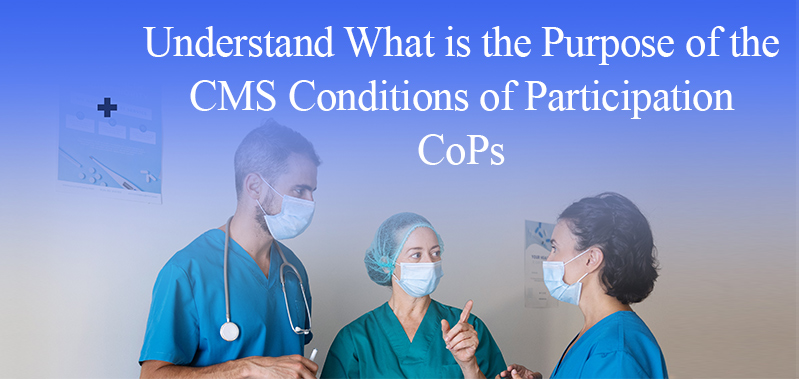
Understand What is the Purpose of the CMS Conditions of Participation CoPs
CMS is a prominent organization that looks after healthcare programs like Medicare and Medicaid. They create a list of rules called Conditions of Participation (CoPs) and Conditions for Coverage (CFCs). These rules are like a checklist that hospitals and clinics must follow to be part of these programs. These rules are essential because they focus on health and safety. They make sure hospitals and clinics provide good care and keep patients safe. CMS also checks on other organizations that make sure hospitals follow the rules. This way, CMS helps ensure everyone in the program gets the best possible care.
Every hospital should have a copy of the Centers for Medicare & Medicaid Services (CMS) up-to-date Conditions of Participation (CoP) and Interpretive Guidelines (IG) because surveyors use them to guide inspections, and following such guidelines helps to ensure full reimbursement. CoPs cover things like patient rights, staffing, and cleanliness. It can be a big deal if a hospital or clinic doesn't follow the rules (Conditions of Participation). It's like not following the instructions on a game - things won't work either. There can be a few consequences for not following the rules. First, the government might ask the hospital to make a plan to fix the problems. They might also need to pay a fine or do more paperwork to show they follow the rules. In severe cases, the hospital could be removed from the government healthcare programs. But this is rare and only happens if the hospital doesn't fix the problems after they've been given a chance.
Why were Conditions of Participation created?
Back then, not all hospitals, especially those in rural areas, signed up for a program that checked if they provided good care. This program was voluntary, but the government wanted to ensure everyone in their healthcare programs (like Medicare and Medicaid) received safe and good quality care. So, they created a set of rules called Conditions of Participation. These rules are like a checklist that hospitals and clinics must follow to be part of these programs.
How do Conditions of Participation work?
Different rules exist for healthcare facilities, like outpatient clinics, treatment centers, and surgery centers. This way, every kind of place has specific safety guidelines they need to follow to provide the best care possible. Like any good map, a CMS Hospital CoPs needs regular check-ups. You'll want to assess how well your system works and make any adjustments required to ensure ongoing compliance.
The Conditions of Participation are for hospitals and clinics that want to be part of government healthcare programs. This contains different sections that cover many important things, such as: Following the rules means being ready for emergencies like power outages or in case of fire, keeping things clean and safe, treating patients with respect for their rights, having enough nurses to take care of them, and keeping good records in case of any scrutiny. There are even more specific rules within each section. For example, the "surgical services" section might have rules about how surgery teams are organized and how surgeries are performed. These Conditions of Participation apply to hospitals, nursing homes, and other healthcare facilities that want to participate in government programs. Every facility must follow all the rules to be part of these programs.
The most common way is to get verified by an organization that CMS trusts. These organizations are like experts who check if hospitals are following the rules. One trusted organization is called The Joint Commission (TJC). If a hospital works with TJC, it's like saying they are responsible for following safety guidelines. TJC will even visit the hospital unexpectedly to ensure everything is running smoothly.
Not all hospitals choose to work with these expert organizations. It's completely optional. About a quarter of all the hospitals in these programs don't go this route. Instead, they prove to the government directly that they're following the rules. This involves showing CMS, the government agency, that they meet all the Conditions of Participation. It's like taking a test to show they're qualified. Verification of these CoPs occurs through unannounced compliance audits conducted by either state survey agencies or CMS-approved accreditation organizations.
During these audits, surveyors meticulously assess the healthcare facility's operations to ensure they meet the established patient quality and safety standards. This comprehensive evaluation encompasses all aspects of care delivery, from patient rights and staffing adequacy to medical recordkeeping and infection control protocols. Accreditation organizations hold a unique position in the verification process. They possess the authority to grant "deemed" status to healthcare facilities that demonstrably meet or surpass the CoPs established by CMS. This designation signifies a facility's commitment to exceeding the minimum safety and quality standards, fostering a culture of continuous improvement in patient care.





